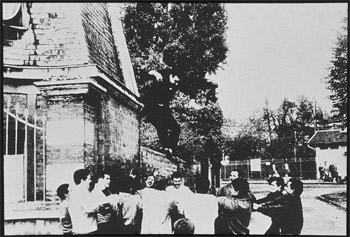
Yves Klein Leap into the Void, 1960
CCA Wattis Institute for Contemporary Arts California College of the Arts 1111 Eighth Street CA 94107 San Francisco États-Unis
Paul McCarthy’s Low Life Slow Life: Part 1 is the first half of an evolving, two-part exhibition presenting sculpture, photography, painting, installation, drawing, performance, video, music, magazines, books, images, memorabilia, documents, and films.
PARTICIPATING ARTISTS: John Altoon, Bob Arentz, Joseph Beuys, Stan Brakhage, Malcolm W. Browne, John Cage, Christo and Jeanne-Claude, Bruce Conner, Paul Cotton, Jay DeFeo, Marcel Duchamp, John Heartfield, Wally Hedrick, Mike Henderson, Allan Kaprow, Yves Klein, Tetsumi Kudo, Yayoi Kusama, Robert Mallary, Paul McCarthy, Gustav Metzger, Allan Midgette, Henry Moore, Saburo Murakami, Bruce Nauman, Yoko Ono, Al Payne, Raivo Puusemp, Kazuo Shiraga, Tony Smith, Karlheinz Stockhausen, Doyle Strong, Stan VanDerBeek, Irby Walton, Andy Warhol
CURATED BY: Paul McCarthy
Paul McCarthy’s Low Life Slow Life is a two-part exhibition curated by the acclaimed Los Angeles–based artist Paul McCarthy. It showcases a wide range of artists and artworks related to McCarthy’s memories from his career, as well as a number of his own works. This first part investigates McCarthy’s student years in Salt Lake City in the 1960s and his early career in the Bay Area during the 1970s. The second part, to be presented in 2009, will focus on his years in Los Angeles and map out the period from the mid-1970s to the present.
McCarthy’s curatorial selections are eclectic and unconventional, deriving more from his personal recollections than from any historical, objective measure of artistic influence. The works on display range from sculptures and paintings to magazines, books, artifacts, memorabilia, films, videos, photographs, installations, and reproductions or remakes of artworks that no longer exist or that McCarthy only ever encountered as reproductions. The featured artists will include such established figures as Henry Moore and Allan Kaprow and lesser-known artists such as Wally Hedrick and Al Payne. An extensive film program and a number of reenactments of historical performance pieces will also be part of the exhibition.
Although McCarthy did not achieve international recognition until the 1990s, he has been an influential figure on California’s art scene for more than 30 years. His early performance work of the 1970s explored the body and sexuality. The intensity of these performances, which often included graphic depictions of taboo sub-jects, eventually led him to further explorations and exploitations of video and film, special effects, and large-scale installations as he continually strove to heighten the effect of his work. Today McCarthy is considered one of the most influential living American artists.
LECTURE BY PAUL McCARTHY: Tuesday, February 12, 7 p.m.
FILM SCREENINGS: An extensive film program will accompany the exhibition, including films by Stan Brakhage, Bruce Conner, Bruce Nauman, Yayoi Kusama, Yoko Ono, Stan VanDerBeek, and Andy Warhol. For a complete list of films and screening times please visit http://www.wattis.org
The lecture and film screenings take place in Timken Lecture Hall, California College of the Arts, 1111 Eighth Street (at 16th and Wisconsin), San Francisco CA 94107. All events are free and open to
the public.
Paul McCarthy’s Low Life Slow Life is curated by Paul McCarthy and organized by Jens Hoffmann, director of the CCA Wattis Institute, and Stacen Berg, assistant curator of the CCA Wattis Institute.
About the CCA Wattis Institute
The Wattis Institute for Contemporary Arts was established in 1998 in San Francisco at California College of the Arts. It serves as a forum for the presentation and discussion of international contemporary art and curatorial practice. Through groundbreaking exhibitions, the Capp Street Project residency program, lectures, symposia, and publications, the Wattis Institute has become one of the leading art institutions in the United States and an active site for contemporary culture in the Bay Area.
Founding support for CCA Wattis Institute for Contemporary Arts programs has been provided by Phyllis C. Wattis and Judy and Bill Timken. Generous support provided by the Phyllis C. Wattis Foundation, Grants for the Arts / San Francisco Hotel Tax Fund, Ann Hatch and Paul Discoe, and the CCA
Curator’s Forum.
